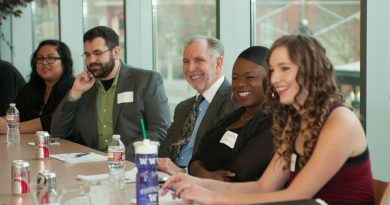The 3rd Annual “Living Breath of W???b?altx?” Summit Will Explore Indigenous Ways of Knowing
Two years ago the University of Washington’s American Indian Studies department (AIS) embarked on a mission to create a symposium which engaged participants in exploring ways to sustain cultural food practices and to share the knowledge of Indigenous people.
Now, on May 30, 2015 gracing UW again, “The Living Breath of W???b?altx?” Indigenous Ways of Knowing Cultural Food Practices and Ecological Knowledge Summit” will be held. Free to all UW students the summit will be held at the new W???b?altx? (the Lushootseed word for “Intellectual House”) at the UW Seattle campus from 9-5 p.m. with lunch provided. All are welcome. For non-UW students the registration fee is $20 which also includes lunch and beverage. According to the AIS event announcement, “We are holding this summit to discuss how we can continue to utilize this symposium to better serve our Indigenous communities as we continue to foster dialogue and build collaborative networks to sustain our cultural food practices and preserve our healthy relationship to the land, water, and all living things.”
UWT’s very own Dr. Michelle Montgomery is on the planning committee, working collaboratively to plan the summit. She started out as an invited panelist, which led to an invitation to be a member of the planning committee.
“Planning requires commitment and community collaboration, but most importantly, acknowledging the cultural protocols and traditions of Indigenous peoples when sharing traditional knowledge,” Montgomery said.
The committee is made up of two chairs, both associate professors in the American Indian Studies department at UW Seattle, Dr. Charlotte Coté and Dr. Dian Million, leading the path for the remaining members, Dr. Clarita Lefthand-Begay, Dr. Michelle Montgomery, Susan Balbas, Michelle Daigle, and Melissa Woodrow.
Montgomery said the summit’s goals are, “to bring together individuals to share their knowledge and expertise on topics such as tribal food sovereignty initiatives, food justice and security, traditional foods and health, Indigenous foods systems and global climate change, and treaty water and fishing rights.” The summit intends to do this through roundtable panelists and discussion. To give students an idea of discussions, AIS offered example questions like: “What does food sovereignty mean to you? How can we utilize this forum to enrich our foods and ecological knowledge and support tribal efforts to restore, revitalize, and strengthen our cultural foods systems?” There will also be an eight-person roundtable panel including associate professors of Indigenous politics and Indigenous governance and frontline advocates for Indigenous food sovereignty.
The event is sponsored by UW’s AIS Department and UW Tacoma’s MEDEX among others. Montgomery says, “It has been an honor to work with a committee of Indigenous women and communities to create a space to share traditional knowledge that connects the past to the present,” adding that the committee sends “humble gratitude to all of our sponsors.”
Montgomery said, “My personal goals are to move forward the need for Indigenous matrilineal empowerment and traditional knowledge as a means for sustainability on multiple levels. I have been taught that we are all sacred. From a traditional lens as an Indigenous woman, activist, and educator—I hope to witness the empowerment of ‘voice’ and collaborations of communities for traditional sustainability.”






